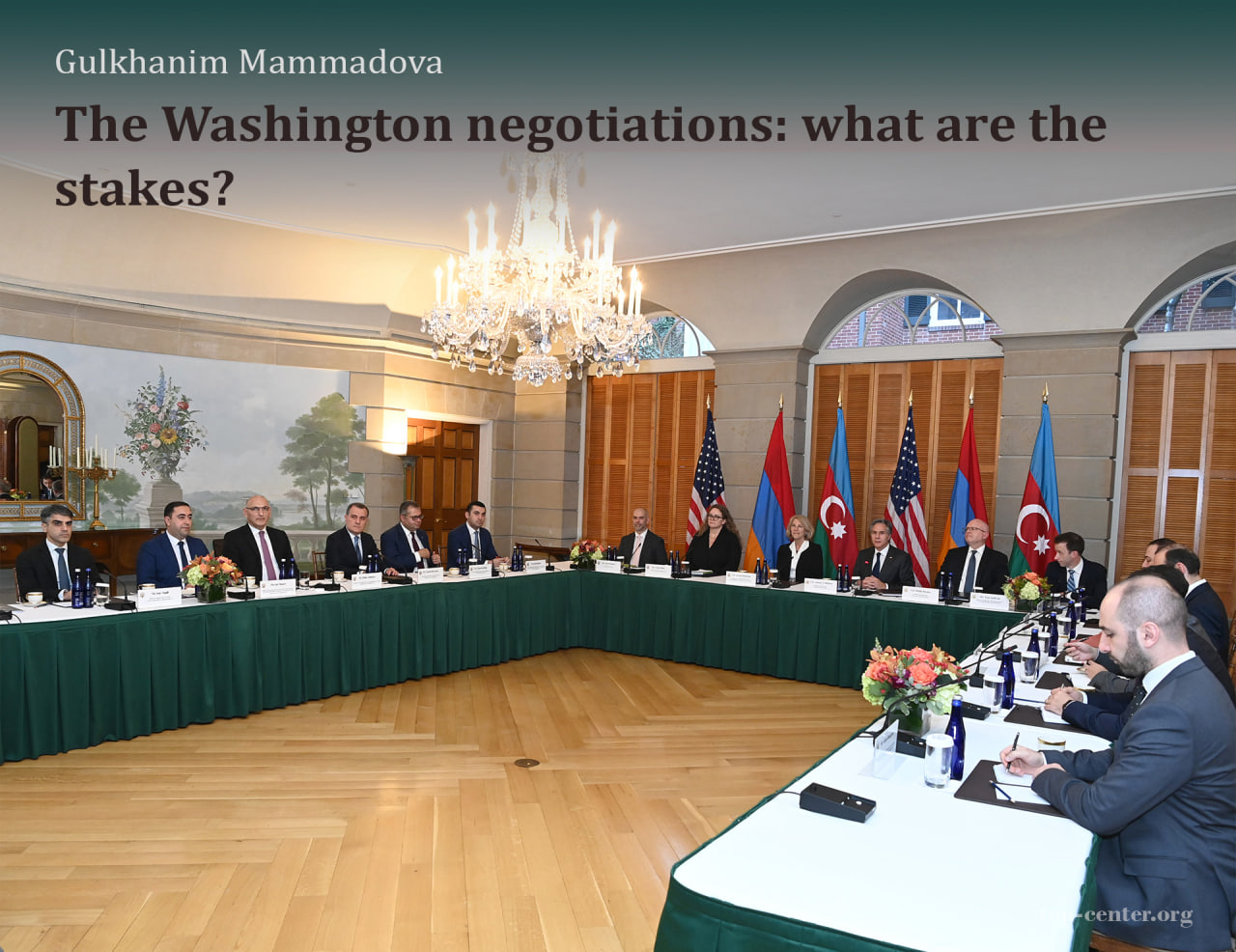The Washington negotiations: what are the stakes?

The impending meeting in Washington between the Foreign Ministers of Armenia and Azerbaijan scheduled to start on June 27th holds paramount significance as countries yearn for an ultimate breakthrough over the protracted conflict. But what are the pivotal stakes entwined in the negotiations and the unwavering objectives of both countries, as well as the short-term goals they must accomplish?
The peace negotiations that followed the Second Karabakh War were driven by specific goals. Azerbaijan's primary objective has been to cement its military victory and capitalize on the leverage. By securing the return of the occupied territories, Azerbaijan has been aiming to de-internationalize and de-territorialize possible ethnopolitical arrangements for Karabakh Armenians as well as reestablish its control over strategic locations and vital transportation routes, notably the Lachin corridor, with the ultimate objective being the reintegration of the entire Karabakh including the territories currently held by secessionist Armenian enclave. Furthermore, the return of IDPs is crucial for Azerbaijan, as it would restore fundamental human rights and build demographic momentum in the region.
Armenia, on the other hand, is facing the challenge of negotiating from a position of military defeat and trying to procrastinate negotiations until favorable geopolitical conditions for itself. Its primary goal in the negotiations has been to ensure the physical security of the Armenian population residing in Nagorno-Karabakh. Yerevan sought guarantees for the protection of their rights, safety, and cultural identity, including provisions for possible autonomy. The aim is to address the final status of Nagorno-Karabakh itself, even though there has been a major shift - from self-determination to security guarantees - in the official discourse coming from the Armenian authorities.
These contrasting goals of the two parties and the clash of interests of the West and Russia have been posing significant challenges throughout the ongoing peace negotiations. Finding a balance between Baku's focus on territorial integrity, non-territorial arrangements and Yerevan's emphasis on the security of the Armenian population of Nagorno-Karabakh requires delicate diplomacy and compromises. It necessitates addressing the concerns of both sides, including the underlying historical, ethnic, and territorial complexities of the conflict, to reach a mutually acceptable and sustainable resolution.
As can be observed, negotiations in Moscow and Brussels/Washington significantly diverge in their focal points. In Moscow, discussions gravitate towards imperative connectivity issues, aligned with Russia's vested regional interests. This entails addressing vital aspects such as transport corridors and regional infrastructure, which are crucial for bolstering connectivity and trade within the region. In stark contrast, negotiations in Brussels and Washington place a robust emphasis on critical matters such as the inter-state deal and perhaps, also the rights and security of the Karabakh Armenians. These deliberations delve deeply into the realms of the safeguarding of the Armenian community residing in Karabakh. These contrasting priorities underscore the pronounced disparities in the approaches adopted by the mediators in each respective arena.
In turn, as the peace negotiations progress, the forthcoming Washington rounds represent a pivotal juncture for both Armenia and Azerbaijan to advance their respective objectives and confront the lingering challenges head-on. These negotiations will undoubtedly center around crucial unresolved issues up to this point, including the highly contentious final status of Karabakh Armenians, and the detailed vision with regard to how borders would look like, among others.
First of all, Azerbaijan consistently maintains that the issue of the ethnic Armenian population residing in Nagorno-Karabakh is an internal matter, which can be clearly seen in Azerbaijani Foreign Minister Jeyhun Bayramov`s latest remarks. Baku categorically asserts that the negotiations should primarily center around matters of territorial integrity, the return of IDPs, and broader avenues of political and economic cooperation. While acknowledging the importance of preserving cultural identity, Baku emphasizes that the protection and integration of the ethnic Armenian population into the Azerbaijani society and state structures, on par with other minority groups, will provide the most viable guarantee for their well-being, rights, and cultural heritage.
Consequently, Baku will aim to get rid of the illegal forces and troops of Russian peacekeepers in the region and prevent any incursions or infiltrations across the newly established borders. Accordingly, a core priority for Baku now is fortifying its territorial integrity on the international stage as well as recognition of its control and jurisdiction over the territories, as this would provide a solid foundation for its core security, needs, and regional influence.
In turn, despite differing expectations and perspectives within the Armenian political circles and society at large, Armenia navigates the intricate path of ensuring the security and cultural preservation of the ethnic Armenian population residing in Nagorno-Karabakh. Yerevan advocates for the establishment of robust security guarantees, which imply international mechanisms that will safeguard the rights, safety, and cultural identity of its compatriots in Karabakh. It ardently seeks for measures that would empower the population with a substantial degree of political autonomy.
In addition, most urgently, an immediate priority for Yerevan is to address the establishment of a border checkpoint on the Armenian-Azerbaijani border in the Lachin direction two months ago. Recognizing the vital importance of this transportation route, Armenia aims to secure the unrestricted movement of people and to ensure the uninterrupted flow of goods and services.
The upcoming meeting carries significant weight in the ongoing negotiations between Armenia and Azerbaijan. While Azerbaijan imposes coercive diplomacy and asserts that the issue of the ethnic Armenian population in Karabakh is solely an internal matter, Armenia, in its turn, contends that it is an integral component of the negotiations, as it directly impacts the security, rights, and aspirations of these people. Balancing these divergent priorities demands unwavering commitment and substantial compromises. The forthcoming negotiations, in turn, stand as a watershed moment, holding the utmost significance, as the stakes remain high and the need for a breakthrough becomes paramount. Should the outcome of the meeting turn unfavorable, Azerbaijan may potentially employ what they call a “counter-terrorism” operation in Karabakh to assert its position. Therefore, the task at hand lies in forging a mutually acceptable resolution that not only addresses immediate concerns but also paves the way for lasting peace and stability in the region.







